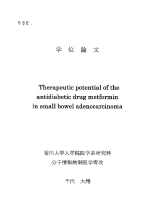Therapeutic potential of the antidiabetic drug metformin in small bowel adenocarcinoma
Access this Article
Author
Bibliographic Information
- Title
-
Therapeutic potential of the antidiabetic drug metformin in small bowel adenocarcinoma
- Author
-
千代, 大翔
- University
-
香川大学
- Types of degree
-
博士(医学)
- Grant ID
-
甲第682号
- Degree year
-
2018-03-24
Note and Description
AbstractSmall bowel adenocarcinoma (SBAC) accounts for 3% of all gastrointestinal tract tumors and approximately 0.5% of all cancer cases. Recent studies have indicated that the use of metformin, one of the most commonly prescribed antidiabetic drugs, is associated with a better prognosis for certain malignant diseases. However, there have been no reports on the effect of metformin in SBAC. In the present study, we evaluated the effect of metformin on human SBAC cell proliferation in vitro and in vivo and identified the microRNAs (miRNAs) associated with its antitumor effects. Metformin inhibited the proliferation of HuTu80 cells in a time- and dose-dependent manner. Importantly, metformin reduced the expression of cyclin D1, cyclin E, cyclin-dependent kinase 4, and phosphorylated retinoblastoma protein, which resulted in cell cycle arrest at the G0/G1 phase. This arrest was accompanied by activation of AMPKα and inhibition of mammalian target of rapamycin and p70s6k. Additionally, metformin reduced the levels of phosphorylated epidermal growth factor receptor and ROR2 as well as markedly altered miRNA expression in HuTu80 cells. Metformin also inhibited tumor growth in vivo in a xenograft mouse model. Our data suggest that metformin might have therapeutic potential in SBAC.
Abstract Small bowel adenocarcinoma (SBAC) accounts for 3% of all gastrointestinal tract tumors and approximately 0.5% of all cancer cases. Recent studies have indicated that the use of metformin, one of the most commonly prescribed antidiabetic drugs, is associated with a better prognosis for certain malignant diseases. However, there have been no reports on the effect of metformin in SBAC. In the present study, we evaluated the effect of metformin on human SBAC cell proliferation in vitro and in vivo and identified the microRNAs (miRNAs) associated with its antitumor effects. Metformin inhibited the proliferation of HuTu80 cells in a time- and dose-dependent manner. Importantly, metformin reduced the expression of cyclin D1, cyclin E, cyclin-dependent kinase 4, and phosphorylated retinoblastoma protein, which resulted in cell cycle arrest at the G0/G1 phase. This arrest was accompanied by activation of AMPKα and inhibition of mammalian target of rapamycin and p70s6k. Additionally, metformin reduced the levels of phosphorylated epidermal growth factor receptor and ROR2 as well as markedly altered miRNA expression in HuTu80 cells. Metformin also inhibited tumor growth in vivo in a xenograft mouse model. Our data suggest that metformin might have therapeutic potential in SBAC.

